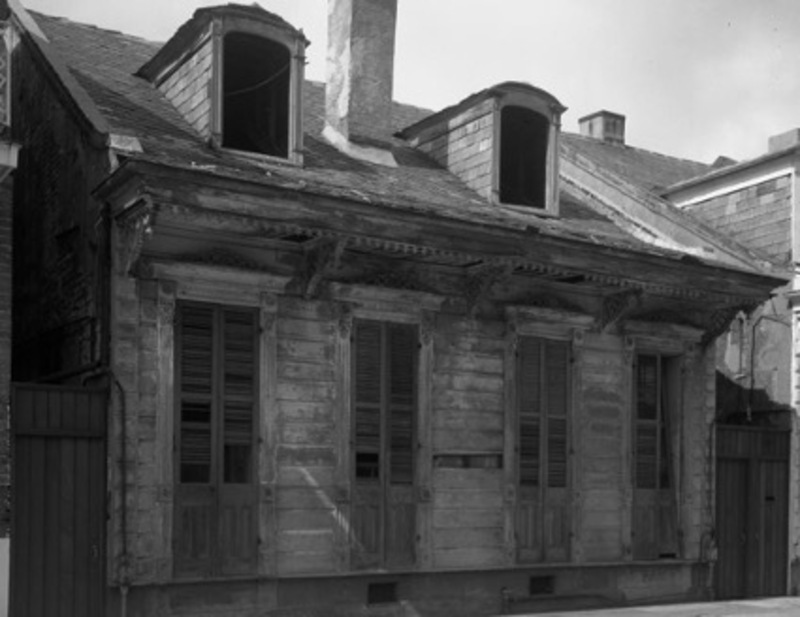Free Negras, Property Owners of this City Story Info
- Title:
- Free Negras, Property Owners of this City
- Date:
- 1770-11-27
- Story:
-
The French and Spanish property laws that are the basis for current Louisiana property law bear precedent in the lives of Geneveva Junon and Maria Juana – two free Black women who negotiated the sale of un solar on Ursulines Ave in New Orleans in 1771. In the case featured here, we see Maria Juana, negra libre, and her associate Genoveva Junon, negra libre, and a property owner on Ursulines, arbitrate the sale and possession of legal title to a plot of land, to Maria Juana, inclusive of thirty feet on which merchant stalls must be placed, on Calle del Arsenal de las Ursulinas (St. Ursulines Avenue) in the French Quarter of New Orleans. Un solar, as referenced here, is a Spanish colonial term for an allotment of land that has not yet been built upon and would require construction within a specific timeframe. The merging of various property laws in colonial Louisiana lends insight into the governance of Spanish Louisiana and, as seen in the case of Genoveva Junon and Maria Juana, offers one example of the many ways in which free Black women navigated and maneuvered through Spanish colonial rule.
Considering the well-documented disenfranchisement of women engaging in property ownership under colonial law, the buying and selling of commercial property in 18th-century Louisiana between two free Black women is significant. Furthermore, the lack of observed objection or recorded alarm from the court witnesses to this sale indicates that such business deals and property transfers between free Black individuals, especially women, might have taken place in Louisiana more frequently than previously believed. Law runs on precedent. As such, precedent and legal norms were most likely set in place ahead of this case, which most likely facilitated this particular transaction between Genoveva Junon and Maria Juana – a sale which saw a prime plot of commercial real estate pass between the hands of two “negras libres” in 1771 with no recorded objections. Supported by this document, los solares with bustling merchant stalls burst into life. Situated between the Ursulines Convent and the Place d’Armes (Jackson Square), we have a glimpse of the heart of the French Quarter, brimming with businesses owned, operated, and kept exclusive amongst free people of color in 18th-century New Orleans.
The sale addressed in this document begs several generative questions: What were the stipulations of the sale? What was the relationship between Genoveva Junon and Maria Juana? What was Maria Juana’s commercial vision? Citing French property law, Maria Juana invokes the hypothèque as a debt instrument, utilizing it in order to place a lien on the property she was buying, smartly protecting her assets.1 However, we also see the blending of French property law with that of the recently instituted laws of the Spanish empire, citing the Ordenamiento de Alcalá de Henares.2 The unknown commercial purpose of Maria Juana’s newly-acquired solar, and the strategic application of French and Spanish property laws to safeguard her financial assets, showcases a moment when two free Black women–well-versed in topics as broad as French and Spanish colonial law, property transfer procedure, and business ownership–were buying, selling, and transferring prime commercial real estate and making a living in their own right.
Notes
For more on this system, see Gregory Smaldone, “Don’t Call it a Mortgage: The Perils of Translation in Early Modern Economy,” Age of Revolutions (October 9, 2023), and in French Louisiana specifically, Vernon Palmer, “The Origins and Authors of the Code Noir,” Louisiana Law Review vol. 56, no. 2 (Winter 1996): 363-407.”
-
Under the French colonial system of property law, a hypothèque was a debt instrument which allowed the owner of a property to collateralize their assets in order to secure a loan.” ↩
-
The legal code in Spanish America, especially with regard to property, was governed or derivative of medieval and Roman laws. Because legally all land belonged to the Crown (realengo), ordinances pertaining to property concentrated on how land concessions should be handled by governing bodies. The Ordenamiento de Alcalá de Henares was a series of such laws that could be called upon to govern land transactions in Spanish America in absence of local ordinances. ↩
-
- Keywords:
- free people of color income law legalism payment sale womanhood work
- Latitude:
- 29.961
- Longitude:
- -90.062
- Documents:
- d0326

